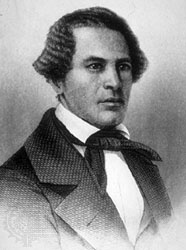Brown, William Wells
American writer
born 1814?, near Lexington, Ky., U.S.
died Nov. 6, 1884, Chelsea, Mass.
 American writer who is considered to be the first African-American to publish a novel. He was also the first to have a play and a travel book published.
American writer who is considered to be the first African-American to publish a novel. He was also the first to have a play and a travel book published.Brown was born to a black slave (slave narrative) mother and a white slaveholding father. He grew up near St. Louis, Mo., where he served various masters, including the abolitionist Elijah P. Lovejoy. Brown escaped in 1834 and adopted the name of a Quaker, Wells Brown, who aided him when he was a runaway. He settled in the Great Lakes region before moving to the Boston area. In 1847 his popular autobiography Narrative of William W. Brown, a Fugitive Slave was published. Its highly dramatic content is set forth in a remarkably detached style. Having educated himself, Brown began lecturing on abolitionism and temperance reform. His antislavery lectures in Europe inspired Three Years in Europe (1852), which was expanded as The American Fugitive in Europe (1855).
Brown's only novel, Clotel (1853), tells the story of the daughters and granddaughters of President Thomas Jefferson and his slave Currer. His only published play is The Escape; or, A Leap for Freedom (1858), a melodrama, with notable comic moments, about two slaves who secretly marry. Brown's historical writings include The Black Man (1863), The Negro in the American Rebellion (1867), and The Rising Son (1873). His final book, My Southern Home (1880), contains miscellanea about slave life, abolitionism, and racism.
- Edmund Dudley
- Edmund Gonville
- Edmund Grindal
- Edmund Gunter
- Edmund Henry Hynman Allenby, 1st Viscount Allenby
- Edmund Henry Hynman Allenby Allenby, 1st Viscount
- Edmund Hodgson Yates
- Edmund Husserl
- Edmund I
- Edmund Ignatius Rice
- Edmund II
- Edmund Jennings Randolph
- Edmund Kean
- Edmund Lancaster, 1st Earl of
- Edmund Ludlow
- Edmund Malone
- E(dmund) Newton Harvey
- Edmund of Abington, Saint
- Edmund of Langley, 1st duke of York
- Edmund of Langley York, 1st duke of
- Edmund Pendleton
- Edmund Plantagenet, 1st earl of Kent
- Edmund Plantagenet Kent, 1st earl of
- Edmund Ruffin
- Edmunds, George Franklin